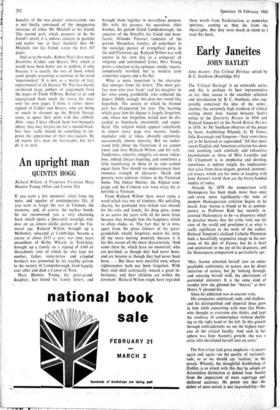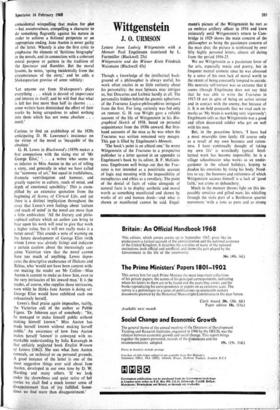Early Janeites
JOHN BAYLEY
Jane Austen : The Critical Heritage edited by B. C. Southam (Routledge 42s) The 'Critical Heritage' is an estimable series, and this is perhaps its best representative so far. One reason is the excellent selection and introduction by B. C. Southam, who sup- posedly conceived the idea of the series: another, the extremely high standard of critical writing about Jane Austen between Scott's notice in the Quarterly Review in 1816 and Richard Simpson's in the North British Review in 1870. As Mr Southam observes of the pieces by Scott, Archbishop Whately, G. H. Lewes, Julia Kavanagh and Simpson—'their views have yet to be bettered or superseded.' All that more recent English and American criticism has done (not counting such scholarly and exhaustive examinations as those of Miss Lascelles and Dr Chapman) is to emphasise and develop, sometimes at tedious length, the implications that arise from these elegant, pointed, economi- cal essays, which are far more in keeping with Jane Austen's world than are the heavy-handed studies of today.
Already by 1870 the comparison with Shakespeare has been made more than once and—even more significantly—the tone of modern Shakespearian criticism begins to be heard. Jane Austen is found to be as Contem- porary as Professor Kott has recently re- asserted Shakespeare to be—a discovery which in practice means that the critic trots out his view of the world and proclaims it as what is really significant in the work of the author. Richard Simpson's civilised Catholic Platonism finds a beautifully responsive image in the out- come of the plot of Emma; but he is brief and uninsistent in the joy of his discovery, and his Shakespeare comparison is particularly apt: 'Miss Austen schooled herself into an unim- peachable conformity to nature, not by direct imitation of nature, but by looking through, and amusing herself with, the aberrations of pretended imitators. It is the same kind of wonder how she gleaned her "theoric" as how Henry V gleaned his, Since his addiction was to courses vain, His companies unlettered, rude, and shallow; and his distinguished and imperial ideas grew in him while consorting with men like Poins, who thought as everyone else thinks, and kept the roadway of commonplace without declin- ing to the right hand or the left. In this growth through contradictions we see the highest exer- cise of the critical faculty. And such in her sphere was Jane Austen's growth; she was a critic who developed herself into an artist.'
The first critics laid great emphasis—h occurs again and again—on the quality of verisimili- tude, or as we should say 'realism,' in the novels. Whately, the thoughtful Archbishop of Dublin, is so struck with this that he adopts an Aristotelian distinction to defend Jane Austen from the imputation of mere reportage and sheltered accuracy. He points out that the defect of most novels is not improbabillly—the
coincidental wirepulling that _makes for plot —but unnaturalness, compelling a character to do something flagrantly against his nature in order to achieve a fictional peripeteia or an appropriate ending. Jane Austen is never guilty of the latter. VVhately is also the first critic to emphasise the element of `fictitious biography' in the novels, and its connection with a coherent moral purpose or pattern in the tradition of the Spectator and Rambler. But the moral lessons, he notes, 'spring incidentally from the circumstances of the story,' and he adds a Shakespearian proviso of some subtlety: 'Let anyone cut from Shakespeare's plays everything . . . which is devoid of importance and interest in itself; and he will find that what is left has lost more than half its charms . . some writers have diminished the effect of their works by being scrupulous to admit nothing into them which has not some absolute . . . merit.'
Curious to find an archbishop of the 1820s anticipating D. IL Lawrence's insistence on the virtue of the novel as 'incapable of the absolute.'
G. H. Lewes in Blackwood's (1859) makes a first comparison with the rising star of 'Mr George Eliot,". . . a writer who seems to us inferior to Miss Austen in the art of telling a story, and generally in what we have called the "economy of art," but equal in truthfulness, dramatic ventriloquism and humour, and greatly superior in culture, reach of mind, and depth of emotional sensibility.' This is exem- plified by an extensive quotation from the beginning of Scenes of Clerical Life, and yet there is a distinct implication throughout the essay that Lewes's own feelings about 'culture and reach of mind' in the novel are more than a little ambivalent. 'All the literary and philo- sophical culture which an author can bring to bear upon his work will tend to give that work
a higher value, but it will not really make it a
better novel.' This sounds a note of warning on the future development of George Eliot (with whom Lewes was already living) and indicates a certain caution about the increasingly san- guine Victorian view that the novel cannot have too much of anything. Lewes depre- cates the descriptive exuberance of Dickens and Balzac, who 'would not have been content with- out making the reader see Mr Collins—Miss Austen is content to make us know him, even to the very intricacies of his inward man.' It is the reader, of course, who supplies those intricacies, even while he thinks Jane Austen is doing sot George Eliot would have exhibited each one exhaustively herself.
Lewes's final praise again impeaches, tacitly, the Victorian cult of the author as Public Figure. `Dr Johnson says of somebody : "Sir, he managed to make himself public without making himself known." Miss Austen has made herself known without making herself public.' An awareness of how Jane Austen makes herself `known' is conveyed with re- markable understanding by Julia Kavanagh in that unfairly neglected book English Women of Letters (1862). She sees what Jane Austen conceals, on technical or on personal grounds.
A good instance of the latter is one of the most suggestive things ever said about Jane
Austen, developed in our own time by D. W.
Harding and many others. 'If we look under the shrewdness and quiet satire of iteV stories we shall find a much keener sense of disappointment than of joy fulfilled: Some- times we find more than disappointment'



































 Previous page
Previous page